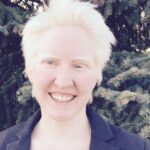The Colorado Disabled Students’ Network (CDSN) was launched in January 2022 to bring together disabled college students for mutual aid and empowerment. We are:
- Disability-led, because we are powerful, capable, and the experts on our own lives.
- Independent of any one school or institution, so we can advocate for systemic change.
- Cross-disability, so we can all benefit from the diversity of experiences and skill sets in our community.
- Attentive to our differences, including differences in race, gender, and financial status that impact each disabled student’s experience.
- Committed to working together.
The CDSN will evolve in response to the needs, ideas, and contributions of everyone who participates.
Our first formal project is our College Bound 2022 program, organized in partnership with the Center for People with Disabilities. We envision this summer program growing into a year-round series of opportunities for networking and information-sharing. We are excited to hear from our community, so please reach out with any ideas or suggestions you have for this project!
The story behind CDSN
From Anna Reid, CDSN founder:

When I started college, I encountered a variety of access barriers, including course materials that I couldn’t read, confusing and burdensome processes to request accommodations, and dilemmas like how to find my new friends in the dining hall. At the beginning, and again later in grad school when my disabilities changed and I needed new accommodations, I didn’t know what to ask. I didn’t know enough about my options and my rights, and I didn’t know if I could trust that the school was doing all that it could, or legally should, to ensure equal access. When things felt hard or unjust, it was sometimes easier to do without accommodations than to fight. I often felt alone.
Ultimately, I did well in college and learned an immense amount about myself, my disabilities, ableism, and how to be a rockstar self-advocate. I developed keen communication skills and became expert at navigating systems and relationships within those systems. I made friends at every level of the schools I attended and left with more connections and real-world skills than did many of my non-disabled peers.
Along the way, I learned the most from my disabled peers. I found out which professors and administrators were disability-friendly, and which to avoid. From fellow blind people, I learned about access technologies, and from a student with depression, I found out about options for mental health accommodations and gained the confidence to pursue them. My biggest lesson in advocacy came from a disabled peer who helped and supported me through an accommodations grievance process, going so far as to attend meetings with me so I had someone in my corner.
All of this instilled in me a certainty that my fellow disabled people are some of the most badass, resourceful, and knowledgeable people around. In addition to having our respective areas of interest and expertise, we know more than most non-disabled doctors, educators, advisors, and “experts” ever can about how to navigate life with a disability. We have so much to offer to each other, to our schools, and to the world.
These experiences and ideas are not unique to me. There is a long and beautiful history of mutual aid between people with disabilities. (Check out “Care Work,” by Leah Lakshmi Piepzna-Samarasinha, to learn more about this.) I am only articulating my own version of a story that many disabled people can tell.
While I relied on my disabled peers to help me make it through school, I also struggled to find them. Many disabilities are invisible, and stigma and other factors can make it hard for disabled students to find each other. When students do connect and cultivate networks of mutual aid, there is the challenge of keeping these networks going once current students graduate.
These experiences are the inspiration behind the Colorado Disabled Students’ Network. The infrastructure of the CDSN is maintained by college graduates who can keep the project running while current student leaders emerge and determine our activities. We are independent of any one school so that our network can be as broad as possible and so that we can exchange information about barriers and solutions at different schools.
All in all, we hope to be the resource that we wish we’d had when we started college. Please join us!